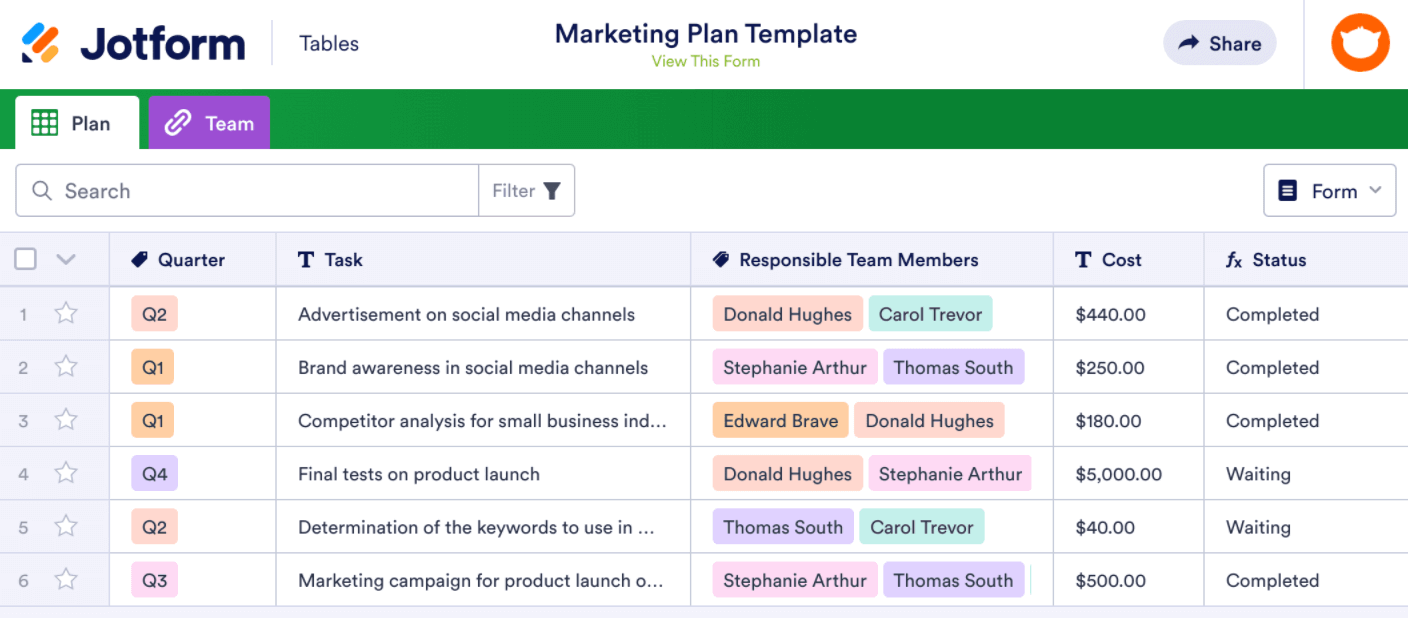A well-conceived marketing plan is essential to driving sales, but don’t get lulled into thinking that conceiving and executing the plan are all that matter. Comprehensively tracking the marketing plan after launch is crucial to maximizing your results.
As the business adage goes, you can only manage what you measure. So getting the most from every dollar in your marketing budget requires you to track your campaigns.
UTM (Urchin Tracking Module), that seemingly random bit of code at the end of a URL, has been the key to tracking online behavior ever since Urchin Software (which became Google Analytics) developed the code in the late 1990s.
UTM makes it possible to track user engagement in your digital marketing channels that originates from outside sources. You can add any number of UTM values to track in Jotform forms and view the results in Jotform Tables.
Here are some essential areas to track for marketing campaigns.
Your website
Analytics are fundamental to getting information about the visitors to your website. What led them to your site? How long did they spend there? Which pages did they go to, and how long did they stay?
Your goal is to learn which tactics get the most response and track how that engagement converts to new followers, further inquiries, and sales. The ultimate metric is the number of new and returning customers who make purchases.
You have your pick of analytics tools, but Google Analytics is free and remarkably easy for beginners to use — while still providing more complex, in-depth analysis options for experienced users. Google Analytics pools data to provide detailed reports on any aspect of your digital campaign, including overall traffic, bounce rate, pay-per-click (PPC) campaigns, and more.
Your CRM
Customer relationship management (CRM) platforms are generally for managing sales prospecting and leads, but you can adapt them to track marketing campaigns. Integrating data gathered from your digital marketing campaign into your CRM will provide the necessary detail to create the personalized profiles that convert prospects into customers.
Jotform integrates easily with all major CRM tools to simplify the process of filtering prospects by campaign ID, lead source, or referral program. Analyze the data and use the email marketing automation tools to personalize marketing outreach to new leads.
Ad conversion
A conversion tracking tool comes standard when you advertise on any of the major digital ad channels. Tracking ad conversions tells you in real time who’s paying attention to your paid campaigns, the actions that leads take when responding to your ads, and whether the campaign is leading to sales.
Conversion tracking tools quickly sort whatever metrics you value most — sales, app downloads, newsletter signups, etc. Tracking how your ads convert will allow you to develop a laser-focused marketing budget.
Phone response
Making a phone call is obviously a lot more work than clicking a box on a website, so a lead who invests the energy to dial their phone — or at least touch the “call now” button on a website — is a serious prospect.
Almost two-thirds (65 percent to be precise) of Fortune 500 companies rank customer phone inquiries as their highest-quality sales lead. The same is true for much smaller businesses. Roughly 61 percent of local mobile searches result in a phone call to the business or type of business the customer was searching for.
Knowing how customers found your business phone number is important information when it comes to targeting your ads. Call tracking technology can help you determine which marketing channels are generating phone inquiries and how many they’re generating. This technology uses dynamic number insertion (DNI), which is a lot like UTM but for phone calls.
The basic idea is simple — attach a unique phone number to each channel you’re trying to generate leads from, with all the inquiries funneled to your customer service operation. You’ll be able to attribute all phone inquiries to that number to a specific ad.
This simple idea gets a lot more challenging to execute for contemporary marketers who are working on dozens, even hundreds, of lead generating efforts. To manage the process, marketers can use programmable voice APIs, which can set up dedicated numbers and retrieve call data to monitor on a dashboard. This lets marketers redirect their advertising to the channels that have the best results.
Tracking the results of your marketing campaign — through both digital marketing and conventional, offline media — is no less important or data-driven than formulating your marketing plan in the first place. Marketing professionals know when they set their plan in motion that no matter how well conceived it is, they’ll find ways to improve results by monitoring the customer response.





























Send Comment: